
Responding to the Emergency
Following the tsunami on December 26th 2004, Aid Sri Lanka was formed. Mobilising a team of Sri Lankan and International volunteers the team worked around the clock providing immediate and vital relief to the tsunami survivors around the island.
You can read the accounts from this time in the diary and trace the locations on the interactive map.
Some highlights include:
Mobile Medical Centres:
With the expertise of local and international doctors, a mobile medical clinic toured the country providing much needed medical attention to survivors. The mobile clinic reached a large number of people, avoiding the trip to the overcrowded medial centres and thus permitting them to get on with the clean up operation. As well as attending to the afflictions sustained during the tsunami itself, the doctors also tended to wounds caused in the clear up operations and the illnesses caused from the cramped and unsanitary living conditions. |
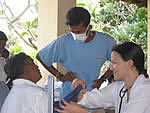 |
Providing Survivors with Essentials:
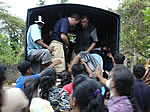 |
The team delivered basic food supplies, clothes and other essentials such as soap, mosquito nets and coils, mats, cooking pots and kerosene stoves to the people who had lost everything. |
Water and Sanitation
One of the major problems in the immediate aftermath of the tsunami was that the water sources were contaminated. In addition to affecting the water available for drinking and washing, the stagnant, dirty water was a breeding ground for mosquitoes and diseases. The team undertook several well and pool cleaning initiatives as well as cleaning existing toilets and installing new ones in camps. |
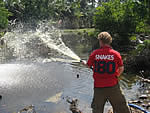 |
Cleaning Up
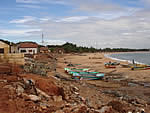 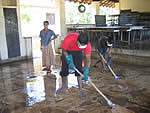 |
In cash-for- work projects local people were provided with the necessary tools and paid to clear the rubble and debris. They cleaned the beaches, roads and public spaces. This work was essential for making the communities habitable and for decreasing the spread of disease from the rotting matter. An important element of this type of initiative is that it gives the survivors something practical to do as well as providing them with an income. Research indicates that following a disaster, people benefit greatly from structure and focussed activity. For the same reason, it is important for children to return to school as soon as possible. It provides a sense of normalcy in what is a chaotic and confusing situation. With many of the schools being used as camps, the Aid Sri Lanka team arranged projects to ensure the schools were clean and safe for the children to return to. |